For most medical students across the nation, Match Day means gathering with classmates—along with family members, mentors and friends—on the third Friday of March to simultaneously discover where they will be training in their medical specialties after graduation. At Indiana University School of Medicine, sealed envelopes will be opened precisely at noon, and students will be invited to share their excitement during a Match Day celebration event.
For eight members of the Class of 2023, however, Match Day will be experienced differently. Their gathering will be much smaller and held after sunset in Eldoret, Kenya, where they will receive an email from the National Resident Matching Program on March 17 at 7 pm Kenya time (noon ET) for the highly anticipated notification revealing which residency programs they will attend.
Although Benjamin Flueckiger’s family won’t be with him on Match Day, his cousin, Marc Kohli, MD, will join him in Eldoret in April. Kohli, an IU School of Medicine graduate, rotated with AMPATH (the Academic Model for Providing Access to Healthcare) in Kenya during his residency in radiology and was engaged as a faculty member for a number of years.
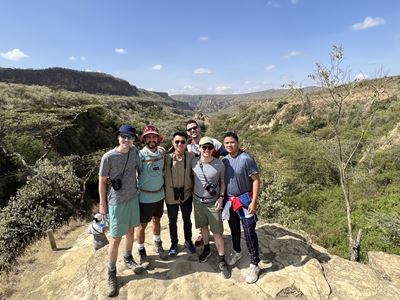 “He espoused the virtues of AMPATH, and it was a driving factor in me wanting to go into medicine,” said Flueckiger, who hopes to match into an internal medicine residency. “I have been wanting to participate in AMPATH since my first year of medical school. The Kenyan people and the experiences so far have been even better than he described.”
“He espoused the virtues of AMPATH, and it was a driving factor in me wanting to go into medicine,” said Flueckiger, who hopes to match into an internal medicine residency. “I have been wanting to participate in AMPATH since my first year of medical school. The Kenyan people and the experiences so far have been even better than he described.”
Flueckiger is spending two months in Kenya as part of a medical student exchange program forged in 1989 between IU School of Medicine and Kenya’s Moi University School of Medicine, now known as AMPATH. The partnership has expanded over the years to include several other institutions with a mission to improve the health of people in underserved communities through building public sector health care services, medical workforce training and medical research.
Since the program began, more than 550 IU School of Medicine students have participated in the AMPATH Kenya educational exchange, and almost 350 Moi University medical students have completed rotations at IU or other AMPATH Consortium institutions. Four Kenyan medical students and three registrars (medical residents) will do rotations with IU School of Medicine this summer, said Adrian Gardner, MD, MPH, director of the IU Center for Global Health.
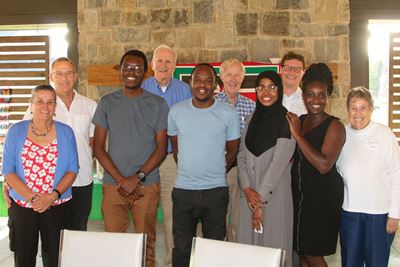 This exchange program allows medical trainees from both countries to gain insights into their nation’s health care system while forming relationships and growing understanding as a foundation for change, said Robert Einterz, MD, who cofounded the program with Drs. Joe Mamlin, Charlie Kelley and David Van Reken. Moi University welcomed its first medical class of 40 students in 1990, and the student exchange began shortly after.
This exchange program allows medical trainees from both countries to gain insights into their nation’s health care system while forming relationships and growing understanding as a foundation for change, said Robert Einterz, MD, who cofounded the program with Drs. Joe Mamlin, Charlie Kelley and David Van Reken. Moi University welcomed its first medical class of 40 students in 1990, and the student exchange began shortly after.
“There were far fewer diagnostic and therapeutic resources, and the robust programs in medical service delivery, medical education and research that we witness now were just in their infancy in the 1990s,” Einterz said. “But, in many other ways, the trainee experiences are similar today, particularly related to opportunities to create and learn from counterpart relationships, practice cultural humility, and gain new perspectives and deeper understanding of oneself and one’s health care systems.”
Learning from ‘one of the greatest global health models in the world’
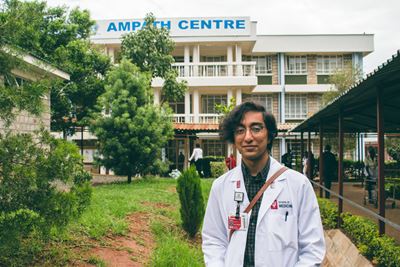 IU medical student Bilal Jawed, who hopes to match into pediatrics, traveled to Kenya in January 2023 for a four-month stay. It’s his third trip to Eldoret with AMPATH, where he is currently working on research projects on surgical site infection rates for C-sections and hand hygiene to reduce hospital-acquired infections. His first trip to Kenya was as a Slemenda Scholar during the summer between his first and second years of medical school.
IU medical student Bilal Jawed, who hopes to match into pediatrics, traveled to Kenya in January 2023 for a four-month stay. It’s his third trip to Eldoret with AMPATH, where he is currently working on research projects on surgical site infection rates for C-sections and hand hygiene to reduce hospital-acquired infections. His first trip to Kenya was as a Slemenda Scholar during the summer between his first and second years of medical school.
“Eldoret has a way of bringing you back once you get a taste of it,” Jawed said. “Entering medical school, I knew I wanted to chase a career serving under-resourced populations through global health but felt I lacked vision on how to make that a reality. The greatest gift my experiences with AMPATH gave me was the time and space I needed to find some of that vision while exposing me to one of greatest global health models in the world and the incredible mentors that exist within it.”
Comparing health care systems of nations is insightful, the medical students say. Due to barriers in accessing care such as lack of transportation or inability to pay, patients in Kenya often present with late-stage diseases.
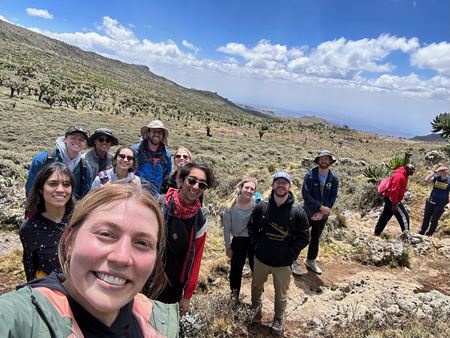 Emily Adaniya, who is hoping to match into general surgery, spent the month of February in Eldoret doing a research elective focused on breast cancer screening.
Emily Adaniya, who is hoping to match into general surgery, spent the month of February in Eldoret doing a research elective focused on breast cancer screening.
“I won’t forget seeing patients’ cancers bleeding through layers of clothing because they did not have access to the necessary screening and treatment,” she said. “My time in Kenya showed me the significant impact that lack of patient education can have and will hopefully result in me taking the extra time to make sure my patients truly understand why screening and surgeries are necessary.”
Patients (in Kenya and the United States) can “slip through the cracks” when social determinants of health—like economic stability, quality education and access to health care—are not met, observed Jawed. He was quick to add, “Some of the best doctors I’ve ever met are Kenyan! They are working within very different systems and with different resources.”
Scarcity of resources often limits testing or means fewer trainees are involved in a surgery to limit use of gowns and other personal protective equipment (PPE), noted Brian Niebuhr, who is completing a surgical rotation in Kenya and hopes to match into general surgery.
“Resource responsibility is something everyone thinks about all the time here, and that will stay with me,” he said.
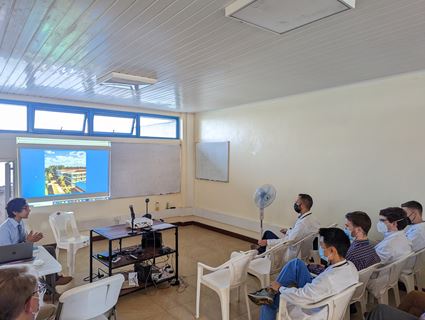 Despite the difference in economic resources, there are some things the Kenyan health care system does better than the U.S. system, say the medical students. Family and friends of a hospitalized patient are considered an essential part of the health care team.
Despite the difference in economic resources, there are some things the Kenyan health care system does better than the U.S. system, say the medical students. Family and friends of a hospitalized patient are considered an essential part of the health care team.
“Family members help their loved ones and also other patients on the ward,” said Flueckiger, who will return to Indiana just before graduation in May. “Many people with suppressed HIV are helping others living with HIV. It’s an amazing thing to see how they work with limited resources.”
Leah Amstutz, who recently completed a two-month clinical rotation in Eldoret, said she appreciates the Kenyan culture of prioritizing relationships.
“In the U.S., we’re more straight to business,” she said. “That’s not the case in Kenya. If you need something, it’s important to first acknowledge the person you’re asking—greeting people and asking them, 'How is your day going?' It’s important to be polite and personable.”
Doing ‘global health’ wherever you are
During a recent fireside chat, IU medical students in Kenya heard from Mamlin, who shared stories from his extensive time with AMPATH. For 19 years from 2000-2019, he and his wife, Sarah Ellen, lived almost exclusively in Eldoret as Mamlin worked with Kenyan colleagues to build a health care system that could combat the HIV crisis there.
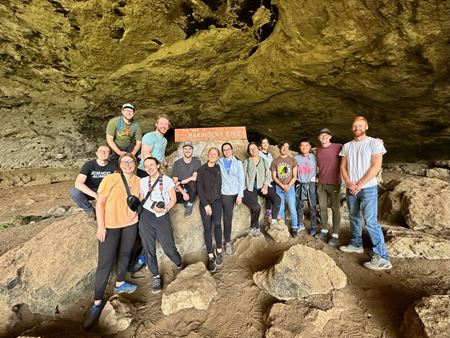 “I am struck by how lucky we medical students are to get to participate in this program,” said Peter Arnold, who will begin the Urology Residency Program at IU School of Medicine following his time in Kenya. “We are truly standing on the shoulders of giants—the likes of Dr. Joe Mamlin and Dr. Bob Einterz and countless other American and Kenyan individuals who have paved the way for such a collaboration. I have learned so much from my Kenyan colleagues.”
“I am struck by how lucky we medical students are to get to participate in this program,” said Peter Arnold, who will begin the Urology Residency Program at IU School of Medicine following his time in Kenya. “We are truly standing on the shoulders of giants—the likes of Dr. Joe Mamlin and Dr. Bob Einterz and countless other American and Kenyan individuals who have paved the way for such a collaboration. I have learned so much from my Kenyan colleagues.”
The AMPATH experience is not only about appreciating differences in how medicine is learned and practiced around the globe; it’s also about seeing the commonalities.
“People always ask me what is different, but so many things are the same,” Jawed said. “Humor is universal, connecting through sports is universal, complaining about medical school is universal. I’ve really enjoyed bonding with the Kenyan medical students.”
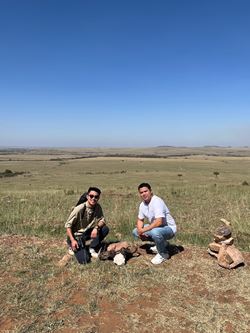 Felix Garcia and Eric Chang, currently roommates in Eldoret, both hope to take what they are learning about global health back to their home countries. Garcia immigrated to the United States from Honduras at age 17, while Chang immigrated from Belize at age 16.
Felix Garcia and Eric Chang, currently roommates in Eldoret, both hope to take what they are learning about global health back to their home countries. Garcia immigrated to the United States from Honduras at age 17, while Chang immigrated from Belize at age 16.
“I do have plans to go back—I don’t know whether to practice medicine there or to help with developing health care policy—so I wanted to experience health care in a lower-resource setting,” said Chang, who hopes to match into a residency program in internal medicine and pediatrics.
Whether he and his peers at AMPATH ultimately practice medicine domestically or abroad, the lessons they’ve learned will forever influence their medical careers.
“Joe Mamlin has this great saying: ‘Global health is just a way of seeing people,’” Jawed said. “You can do global health no matter where you are. Treating people kindly, dealing with health issues holistically, striking at the heart of issues like poverty and education—these are all lessons I’ve learned from AMPATH and will take with me.”
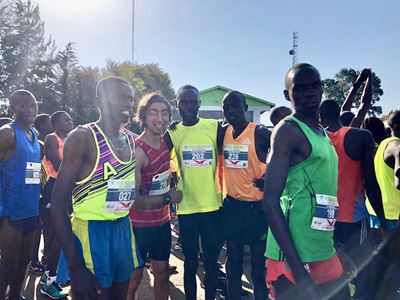 These values and insights are what make the student experience in Kenya not a “medical mission trip” but rather a learning and growing opportunity for medical professionals. Trainees who complete rotations with AMPATH share a curiosity about other cultures and want to experience personal growth as they form their professional identities, said Lu’aie Kailani, MD, medicine team leader in Eldoret.
These values and insights are what make the student experience in Kenya not a “medical mission trip” but rather a learning and growing opportunity for medical professionals. Trainees who complete rotations with AMPATH share a curiosity about other cultures and want to experience personal growth as they form their professional identities, said Lu’aie Kailani, MD, medicine team leader in Eldoret.
“When you put caring people together and have all these wonderful groups of students, full of energy and hope, it makes you think the world will be a better place in the future,” he said.
